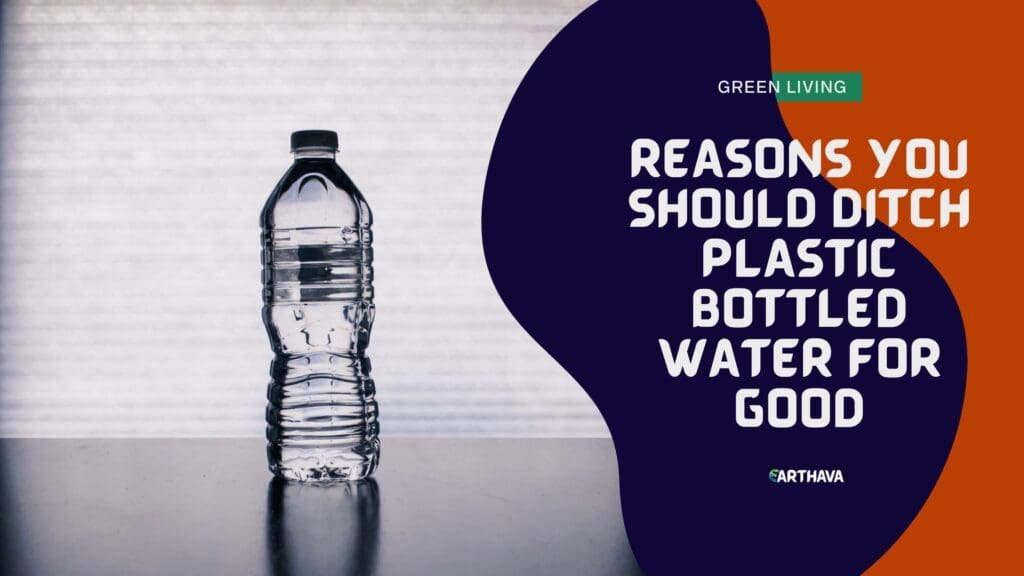Water is a fundamental necessity for us all and having convenient access to it is essential. For decades, one of the most convenient ways to keep hydrated has been plastic water bottles. However, while this is undoubtedly convenient it is incredibly bad news for a planet already teetering on the brink of an environmental calamity.

This one reason should be reason enough to ditch bottled water for good. But, as we discuss in this article, it is far from being the only compelling reason.
The Environmental Impact of Plastic Bottles
This is undoubtedly the most compelling reason to give up plastic water bottles. Most of us are already aware of the problem with single-use plastics but the scale of the problem is huge and getting worse by the minute.
This is highlighted in a research article commissioned by the Public Library of Science (PLOS). The research found that our oceans are infested with a “smog” of 170 trillion plastic particles. Perhaps more worrying is that the report found a “rapid and unprecedented” increase since 2005.
This is a massive problem, but the environmental impact of plastic bottles doesn’t stop there:
·According to Earth Day, Americans purchase about 50 billion plastic water bottles each year. This is the equivalent of about 13 bottles a month for every American.
·Despite widespread recycling schemes the vast majority of bottles will end up in landfill sites.
·A single plastic bottle can take up to 1,000 years to degrade, even biodegradable plastics are not a solution.
·Fossil fuels are the raw ingredients for most plastic bottles giving them a heavy carbon footprint from manufacture to disposal.
·Over-extraction of groundwater for bottled water is depleting the resource often in places where it is most needed.
Perhaps the most worrying point here is that this list is by no means comprehensive. Put simply, bottled water is a major contributor to climate change, resource overuse, and the perilous condition of our oceans and seas.
Health Concerns With Plastic Bottled Water
While there are plenty of concerns with plastic bottled water and the health of the planet, there are also personal health concerns surrounding plastic bottles. And if this isn’t enough to worry about, in many cases there are also health concerns with water itself:
·Plastics within bottled water: Perhaps the most ironic health problem is the high levels of microplastics found within bottled water. A recent study by the State University of New York found that 93% of the bottled waters sampled had excessive levels of microplastics. Some of the worst offenders were major brands like Nestle.
·Forever Chemicals: Toxic PFAS chemicals were found in 39 out of a hundred tested bottled water products in a study undertaken by John Hopkins University.
·Plastic bottles: There is ongoing debate as to whether the chemicals in plastic bottles are detrimental to human health. The consensus is that there are definite health concerns with refilling plastic bottles as carcinogenic chemicals can leach out and build up in your bloodstream.
Plastic bottled water is often thought of as a healthy way to stay hydrated, but this is not necessarily the case and in many instances can be positively detrimental to your health.
Sustainable Alternatives to Plastic Bottled Water
Ultimately, we need to stay hydrated without harming our health or the environment. Luckily, there are plenty of ways to do this – from companies that offer PFAS-free flavor-infused water in reusable water bottles to simply filtering tap water, there are alternatives that can allow you to stay hydrated – and guilt-free!
Here are our top tips to help you ditch plastic water bottles for good:
·Tap water: Tap water, when properly treated and filtered, is a reliable and safe source of drinking water in many regions. Invest in a quality water filter if necessary to ensure the removal of impurities.
·Reusable water bottles: Opt for reusable water bottles made from stainless steel, glass, aluminum, or BPA-free plastic. These bottles are not only eco-friendly but also safer for your health as they don’t leach harmful chemicals.
·Refill stations: Many cities now offer public refill stations where you can conveniently fill your reusable bottle with filtered tap water. Look for these stations in parks, public buildings, and transit hubs.
·Bulk water delivery: Some local businesses offer bulk water delivery services, providing you with clean drinking water in large, refillable containers. This option reduces packaging waste and is often more cost-effective.
Reducing our reliance on plastic water bottles is not optional – it is imperative. By choosing one or more of these alternatives, you can significantly reduce your reliance on plastic bottled water while ensuring your access to safe and refreshing hydration.
Bottling It Up: Why We Need to Ditch Plastic Water Bottles
According to the United Nations Environmental Program, every minute of every day a million water bottles are purchased around the world. This one figure alone should be enough to convince anyone that the use of plastic water bottles is unsustainable.
When you factor in the potential individual health concerns, the picture is even bleaker. Ditching plastic water bottles is essential for the future health of our planet and to protect ourselves from the health risks associated with them.


